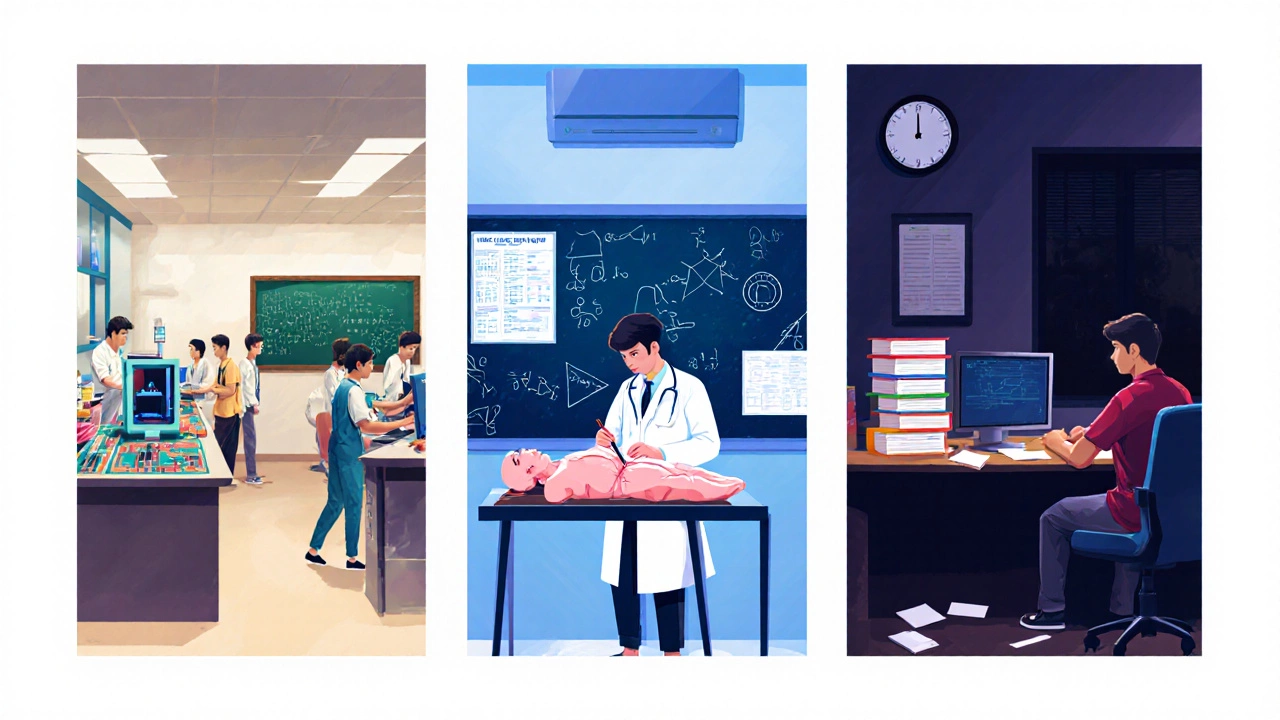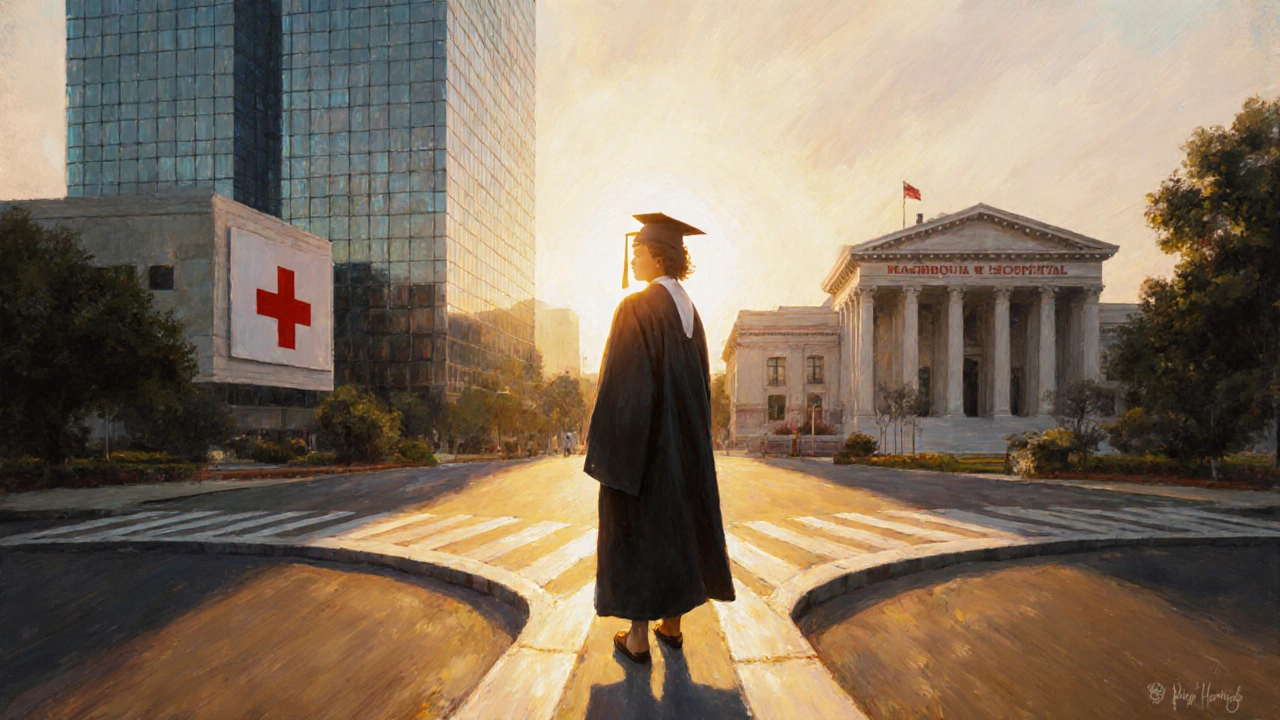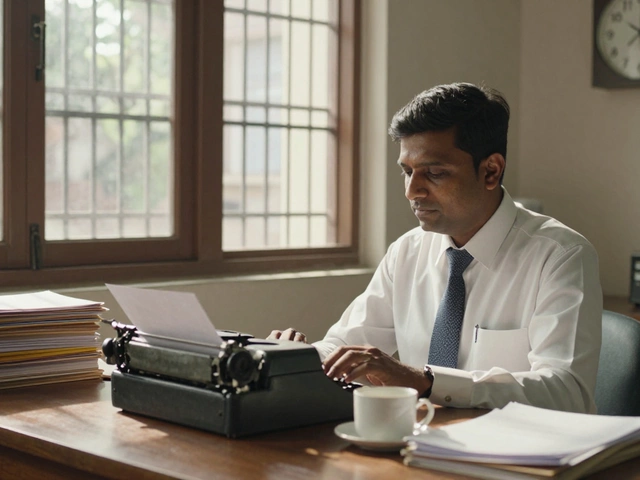
India's Hardest Degree Calculator
Enter your preferences and click the button to see which degree might be the toughest for you.
Quick Takeaways
- The toughest degree varies by criteria: entrance competition, curriculum load, and pass‑rate.
- Engineering (IIT B.Tech), Medicine (AIIMS MBBS), and Civil Services (UPSC) consistently rank at the top.
- High‑stakes entrance exams like JEE, NEET, and UPSC prelims are major gatekeepers.
- Success demands disciplined study plans, peer support, and realistic expectations.
- Choosing a difficult degree should align with long‑term career goals, not just prestige.
When people ask about the toughest degree in India, the answer isn’t a single line. It hinges on three big factors: how fierce the entry test is, how heavy the coursework feels, and how low the success rate is. Below we break down each factor, compare the top contenders, and give you a realistic picture of what life looks like after you pick one of these demanding paths.
How We Judge “Toughness”
Before naming the toughest degree, let’s agree on the yardsticks. We look at four measurable attributes:
- Entrance competition - number of applicants vs available seats.
- Curriculum intensity - credit hours, weekly lab/clinical hours, and project load.
- Pass‑rate or clearance rate - percentage of students who graduate or clear the final exam.
- Career pressure - how much ongoing professional certification or training is expected after graduation.
These metrics are based on official data from the Ministry of Education, AICTE, and reputable university annual reports (2023‑2024). They give us a common ground to compare very different fields like engineering, medicine, and public administration.
Top Contenders for the Toughest Degree
| Program | Key Entrant Exam | Applicants per Seat | Average Weekly Workload | Graduation / Clearance Rate | Typical Post‑Grad Path |
|---|---|---|---|---|---|
| IIT B.Tech (Engineering) | JEE Advanced | ≈ 40:1 | ≈ 45‑50 hrs (labs + projects) | ≈ 92% | R&D, core engineering firms, startups |
| AIIMS MBBS (Medicine) | NEET | ≈ 30:1 | ≈ 55‑60 hrs (clinical + theory) | ≈ 88% | Residency, specialty training, research |
| UPSC Civil Services (IAS/IPS) | UPSC Preliminary & Main | ≈ 1000:1 | Varies - intensive 6‑month preparation plus 2‑year training | ≈ 0.1% | Administrative leadership, policy making |
| IIM Post‑Graduate Programme (Management) | CAT | ≈ 50:1 | ≈ 40‑45 hrs (case studies, projects) | ≈ 94% | Consulting, corporate leadership |
| Chartered Accountancy (CA) | CA Foundation & Intermediate | ≈ 5:1 (high‑school pass‑outs) | ≈ 50‑55 hrs (theory + practical) | ≈ 30% | Audit, taxation, finance consultancy |

Why These Programs Outrank the Rest
Engineering at IITs stands out because JEE Advanced filters out 96% of aspirants. Those who make it face a rigorous blend of theory, design labs, and industry‑grade projects. The semester load often exceeds 20 credit points, forcing students into late‑night coding sessions and continuous assessment.
Medicine at AIIMS is a marathon. NEET already squeezes millions of candidates into a handful of seats, and once inside, students juggle anatomy dissections, biochemistry labs, and clinical rotations that run 12‑hour shifts. The emotional toll of patient care adds a mental‑health dimension most other courses lack.
UPSC Civil Services is a different beast. The prelims‑main‑interview pipeline eliminates virtually everyone; only about 0.1% of applicants secure a final posting. The preparation phase demands mastery of history, polity, economics, and optional subjects, often from scratch.
Management at IIMs and CA also demand relentless study, but they sit a notch below the three above in terms of sheer competition and attrition.
Real‑World Stories: What Students Experience
Rohit, a 2022 IIT Delhi graduate, recalls spending 10‑12 hours daily on problem‑sets, with weekend hackathons that felt like extra exams. He says the culture of “learning by doing” meant no room for procrastination.
Dr. Meera, who cleared AIIMS in 2021, describes a typical day: 8am lecture, 10am dissection, 2pm surgery shadowing, followed by night‑time revision. The burnout rate is high, but many stay because the profession offers unmatched respect and financial security.
Arun, an aspiring IAS officer, spent 18 months poring over NCERT books, coaching notes, and answer‑writing practice. He calls the UPSC journey “a test of stamina more than intellect.” He finally succeeded in 2024, noting that the rigorous selection process forged a strong sense of public duty.
Study Strategies That Make the Hard Path Manageable
Regardless of which degree you chase, certain habits repeat across the board:
- Chunk the syllabus: Break the curriculum into weekly goals. Use a Gantt chart to visualize progress.
- Active recall: Replace passive reading with flashcards (Anki or Quizlet) especially for dense subjects like organic chemistry or constitutional law.
- Peer study groups: Form 4‑5 person teams. Explain concepts to each other; teaching reinforces memory.
- Scheduled breaks: The Pomodoro technique (25min focus, 5min break) reduces fatigue during marathon study sessions for exams like JEE or UPSC.
- Professional mentorship: Seek guidance from seniors who have cleared the same program. Their insights on time‑management and exam‑strategy are priceless.
For medical students, integrating clinical exposure early on-volunteering in hospitals-helps contextualize theory and eases the later heavy rotation phase.
Engineers benefit from building small projects every semester; a functional prototype serves as a portfolio piece and a confidence booster.

Career Outlook After the Toughest Degrees
Choosing a hard degree isn’t just about the grind; it’s about where it can take you.
- IIT engineers command premium salaries (average INR15-20lakhs for fresh grads) and have a global placement record.
- AIIMS doctors start with a stipend of INR1.2lakhs during internship and quickly move to private practice or specialty fellowships that push earnings above INR30lakhs.
- IAS officers enjoy a stable salary structure, but the real reward is influence over policy and the chance to impact millions.
- IIM graduates often land consulting roles with packages crossing INR25lakhs, and entrepreneurship opportunities explode due to strong alumni networks.
- Chartered Accountants become indispensable in audit firms, corporate finance, and tax advisory, with senior partners earning well over INR50lakhs.
All these pathways demand continued learning-whether it’s clearing GATE for higher studies, pursuing MD/MS for doctors, or clearing the UPSC’s optional paper after the first posting.
Is the Toughest Degree Worth It?
There’s no universal answer. If you thrive on competition, enjoy problem‑solving, and have a clear career vision, the payoff can be massive-both financially and in terms of personal growth. But if you’re prone to burnout or lack a strong support system, the stress can outweigh the benefits.
Ask yourself:
- Do I love the subject enough to study it for years without external rewards?
- Can I sustain a high‑intensity schedule, including weekends?
- Is the post‑graduation career path aligned with my long‑term goals?
If you answer “yes” to most, diving into one of these rigorous programs can be a game‑changer.
Frequently Asked Questions
Which degree has the highest competition ratio?
UPSC Civil Services tops the list with roughly 1,000 applicants for every one final posting. JEE Advanced and NEET also show extremely high ratios, around 40:1 and 30:1 respectively.
Is the workload at AIIMS really harder than at other medical colleges?
AIIMS combines a dense theoretical curriculum with intensive clinical rotations. The average weekly hours (55‑60) exceed most private medical schools, and the patient load is higher, making it one of the most demanding programs.
Can I switch from a tough degree like IIT B.Tech to a completely different field later?
Yes. The analytical skills, problem‑solving mindset, and strong alumni network make IIT graduates versatile. Many pursue MBA, data science, or even creative fields after a few years of work experience.
What’s the average salary for a fresh IIT graduate?
In 2024‑2025, the median package for a fresh IIT B.Tech graduate was around INR15lakhs per annum, with top offers from tech giants crossing INR25lakhs.
How long does it take to become a fully qualified doctor after AIIMS MBBS?
After the 5‑year MBBS plus one‑year internship, most doctors spend another 3‑5 years in MD/MS specialization, totaling roughly 9‑11 years of training.




